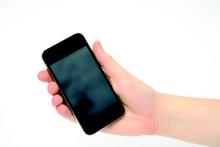Information pulled from cell phone sensor data can provide useful behavioral markers significantly associated with depressive symptom severity, according to Sohrab Saeb, Ph.D., and associates.
The investigators found that several different features pulled from GPS data related to study participants’ depressive symptom severity, including circadian movement, normalized entropy, and location variance. Phone use features, use duration, and use frequency also were related to depressive symptoms, said Dr. Saeb of the center for behavioral intervention technologies in the department of preventive medicine at Northwestern University, Chicago.
The researchers next used the normalized entropy feature and a system separating participants with depressive symptoms (Patient Health Questionnaire [PHQ-9] score greater than or equal to 5) from those without symptoms to identify depressed participants, achieving a success rate of 86.5%. Finally, with the use of normalized entropy data alone to identify the participants’ PHQ-9 scores, an error rate of only 23.5% was achieved.
The study findings “suggest that phone sensors offer numerous clinical opportunities, including continuous monitoring of at-risk populations with little patient burden and interventions that can provide just-in-time outreach,” the investigators concluded.
Find the full study in the Journal of Medical Internet Research (2015 July;17(7):(doi:10.2196/jmir.4273).


